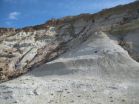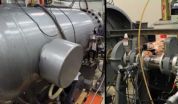(Press-News.org) New York, NY, March 4, 2013 – In a new phase III trial mirabegron, a β3-adrenoceptor agonist, given once daily for 12 weeks, reduced the frequency of incontinence episodes and number of daily urinations, and improved urgency and nocturia in adults with overactive bladder (OAB) compared to those in a placebo group. The incidence of common adverse events (hypertension, urinary tract infection, headache, nasopharyngitis) was similar in the mirabegron and placebo groups in this study. Rates of dry mouth and constipation were similar in the drug and placebo groups. The study is published in the Journal of Urology®.
"Mirabegron is a first in class therapeutic agent with a mechanism of action distinct from that of antimuscarinic agents," says urologist Victor W. Nitti, MD, of the NYU Langone Medical Center. "While antimuscarinic agents are the current pharmacological mainstay for OAB, some patients have a suboptimal response or experience side effects such as dry mouth or constipation. The result is that a high proportion of patients on antimuscarinic drugs discontinue therapy, with only 25% remaining on therapy at one year. We need an alternative therapy for some of these patients."
This randomized, parallel group, double-blind phase III study comprising 1329 patients was conducted at 132 sites in the U.S. and Canada. Those eligible for the study voided 8 or more times daily and experienced 3 or more urgency episodes with or without incontinence over a 3-day period. After 2 weeks of receiving placebo, 454 patients were randomized to continue to receive placebo, 442 were given 50 mg mirabegron and 433 received 100 mg mirabegron daily for 12 weeks.
Compared to the placebo group, both mirabegron treatment groups showed statistically significant (p END
Study shows mirabegron effective and well tolerated for overactive bladder
New option for patients bothered by antimuscarinic side effects, reported in the Journal of Urology
2013-03-05
ELSE PRESS RELEASES FROM THIS DATE:
New research confirms plight of bumble bees, persistence of other bees in Northeast
2013-03-05
A new study shows that although certain bumble bees are at risk, other bee species in the northeastern United States persisted across a 140-year period despite expanding human populations and changing land use. Led by Rutgers University and based extensively on historical specimens from the American Museum of Natural History and nine other bee collections, the study informs conservation efforts aimed at protecting native bee species and the important pollinator services they provide. The results are published today in Proceedings of the National Academy of Sciences.
Eighty-seven ...
Protein synthesis blocker may hold key to reducing effects of traumatic events
2013-03-05
Reducing fear and stress following a traumatic event could be as simple as providing a protein synthesis blocker to the brain, report a team of researchers from McLean Hospital, Harvard Medical School, McGill University, and Massachusetts General Hospital in a paper published in the March 4 issue of Proceedings of the National Academy of Sciences.
"This is an important basic neuroscience finding that has the potential to have clinical implications for the way individuals with posttraumatic stress disorder are treated," said Vadim Bolshakov, PhD, director of the Cellular ...
Stress hormone foreshadows postpartum depression in new mothers
2013-03-05
Women who receive strong social support from their families during pregnancy appear to be protected from sharp increases in a particular stress hormone, making them less likely to develop postpartum depression, according to a new study published in Clinical Psychological Science, a journal of the Association for Psychological Science.
"Now we have some clue as to how support might 'get under the skin' in pregnancy, dampening down a mother's stress hormone, and thereby helping to reduce her risk for postpartum depression," said Jennifer Hahn-Holbrook, a UCLA National Institute ...
Vitamin deficiency screening needed for refugees
2013-03-05
New research from the University of Adelaide has discovered a high prevalence of vitamin B12 deficiency among refugees, prompting calls for refugees to be routinely screened for the problem soon after they arrive.
Vitamin B12 deficiency is a sign of severe malnourishment and can result in permanent damage to the nervous system. For women of child-bearing age, vitamin B12 deficiency can lead to developmental defects in their unborn children. If left untreated, the deficiency could be fatal.
In the first study of its kind in the world, researchers from the University ...
'True grit' erodes assumptions about evolution
2013-03-05
Dining on field grasses would be ruinous to human teeth, but mammals such as horses, rhinos and gazelles evolved long, strong teeth that are up to the task.
New research led by the University of Washington challenges the 140-year-old assumption that finding fossilized remains of prehistoric animals with such teeth meant the animals were living in grasslands and savannas. Instead it appears certain South American mammals evolved the teeth in response to the gritty dust and volcanic ash they encountered while feeding in an ancient tropical forest.
The new work was conducted ...
MIT researchers develop solar-to-fuel roadmap for crystalline silicon
2013-03-05
CAMBRIDGE, MA -- Bringing the concept of an "artificial leaf" closer to reality, a team of researchers at MIT has published a detailed analysis of all the factors that could limit the efficiency of such a system. The new analysis lays out a roadmap for a research program to improve the efficiency of these systems, and could quickly lead to the production of a practical, inexpensive and commercially viable prototype.
Such a system would use sunlight to produce a storable fuel, such as hydrogen, instead of electricity for immediate use. This fuel could then be used on demand ...
Lawrence Livermore helps find link to arsenic-contaminated groundwater
2013-03-05
Human activities are not the primary cause of arsenic found in groundwater in Bangladesh.
Instead, a team of researchers from Lawrence Livermore National Laboratory, Barnard College, Columbia University, University of Dhaka, Desert Research Institute and University of Tennessee found that the arsenic in groundwater in the region is part of a natural process that predates any recent human interaction, such as intensive pumping.
The results appear in the March 4 edition of the Proceedings of the National Academy of Sciences.
Millions of people in Bangladesh and neighboring ...
BUSM researchers use goal-oriented therapy to treat diabetic neuropathies
2013-03-05
(Boston) – Researchers at Boston University School of Medicine (BUSM) and VA Boston Healthcare System (VA BHS) have found that cognitive behavioral therapy (CBT) can help relieve pain for people with painful diabetic neuropathies. The study, which is the first of its kind to examine this treatment for people with type II diabetes mellitus, is published in the March issue of the Journal of Pain.
Type II diabetes mellitus is the most common form of the disease and affects more than 20 million Americans. The onset of type II diabetes mellitus is often gradual, occurring ...
How the brain loses and regains consciousness
2013-03-05
CAMBRIDGE, MA -- Since the mid-1800s, doctors have used drugs to induce general anesthesia in patients undergoing surgery. Despite their widespread use, little is known about how these drugs create such a profound loss of consciousness.
In a new study that tracked brain activity in human volunteers over a two-hour period as they lost and regained consciousness, researchers from MIT and Massachusetts General Hospital (MGH) have identified distinctive brain patterns associated with different stages of general anesthesia. The findings shed light on how one commonly used ...
NASA Goddard lab works at extreme edge of cosmic ice
2013-03-05
VIDEO:
NASA scientists at the Goddard Cosmic Ice Lab are studying a kind of chemistry almost never found on Earth. The extreme cold, hard vacuum, and high radiation environment of space...
Click here for more information.
Behind locked doors, in a lab built like a bomb shelter, Perry Gerakines makes something ordinary yet truly alien: ice. This isn't the ice of snowflakes or ice cubes. No, this ice needs such intense cold and low pressure to form that the right conditions ...
LAST 30 PRESS RELEASES:
Toxic exposure creates epigenetic disease risk over 20 generations
More time spent on social media linked to steroid use intentions among boys and men
New study suggests a “kick it while it’s down” approach to cancer treatment could improve cure rates
Milken Institute, Ann Theodore Foundation launch new grant to support clinical trial for potential sarcoidosis treatment
New strategies boost effectiveness of CAR-NK therapy against cancer
Study: Adolescent cannabis use linked to doubling risk of psychotic and bipolar disorders
Invisible harms: drug-related deaths spike after hurricanes and tropical storms
Adolescent cannabis use and risk of psychotic, bipolar, depressive, and anxiety disorders
Anxiety, depression, and care barriers in adults with intellectual and developmental disabilities
Study: Anxiety, gloom often accompany intellectual deficits
Massage Therapy Foundation awards $300,000 research grant to the University of Denver
Gastrointestinal toxicity linked to targeted cancer therapies in the United States
Countdown to the Bial Award in Biomedicine 2025
Blood marker from dementia research could help track aging across the animal world
Birds change altitude to survive epic journeys across deserts and seas
Here's why you need a backup for the map on your phone
ACS Central Science | Researchers from Insilico Medicine and Lilly publish foundational vision for fully autonomous “Prompt-to-Drug” pharmaceutical R&D
Increasing the number of coronary interventions in patients with acute myocardial infarction does not appear to reduce death rates
Tackling uplift resistance in tall infrastructures sustainably
Novel wireless origami-inspired smart cushioning device for safer logistics
Hidden genetic mismatch, which triples the risk of a life-threatening immune attack after cord blood transplantation
Physical function is a crucial predictor of survival after heart failure
Striking genomic architecture discovered in embryonic reproductive cells before they start developing into sperm and eggs
Screening improves early detection of colorectal cancer
New data on spontaneous coronary artery dissection (SCAD) – a common cause of heart attacks in younger women
How root growth is stimulated by nitrate: Researchers decipher signalling chain
Scientists reveal our best- and worst-case scenarios for a warming Antarctica
Cleaner fish show intelligence typical of mammals
AABNet and partners launch landmark guide on the conservation of African livestock genetic resources and sustainable breeding strategies
Produce hydrogen and oxygen simultaneously from a single atom! Achieve carbon neutrality with an 'All-in-one' single-atom water electrolysis catalyst
[Press-News.org] Study shows mirabegron effective and well tolerated for overactive bladderNew option for patients bothered by antimuscarinic side effects, reported in the Journal of Urology


